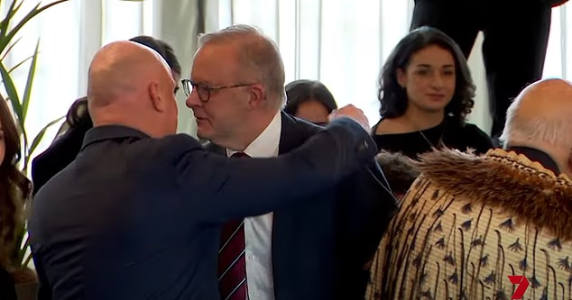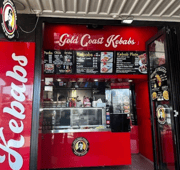‘Poor Albanese had no choice’: THIS moment showed unexpected tension between leaders
By
Maan
- Replies 0
Anthony Albanese found himself in an awkward diplomatic moment that quickly caught the attention of many.
What was meant to be a respectful Māori greeting between the Australian and New Zealand leaders turned unexpectedly uncomfortable.
The incident has sparked plenty of discussion online about the nuances of cultural protocol and political interaction.
During a visit to Queenstown for the annual Australia, New Zealand Leaders’ Meeting, Albanese successfully performed the hongi — the traditional Māori greeting involving the pressing of noses — with members of the local iwi.
However, when he moved to greet New Zealand Prime Minister Christopher Luxon in the same manner, Luxon instead offered a standard handshake, catching Albanese off guard.
The Australian leader then awkwardly shifted into a hug, highlighting the unexpected clash of greeting styles.
The moment quickly went viral on social media, with users offering a mix of amusement and sympathy.
One joked: ‘Chris Luxon is clutching Albanese like a small child clutches its mother.’
Another added: ‘Poor Albanese had no choice. Once Luxon zooms in with his arms outstretched, you’re done for.’
Some commenters even linked the incident to an earlier episode in which Luxon was booed during an ANZ Netball Premiership match, noting the irony of the reception.
That previous incident, captured on official broadcast footage, showed sections of the crowd jeering as Luxon walked onto the court to present awards.
Despite the awkward greeting, some New Zealanders defended Albanese, expressing disappointment at how the Prime Minister was treated.
‘This is so embarrassing,’ one wrote. ‘Could someone from the [New Zealand National Party] have a word with Christopher Luxon? Poor Anthony Albanese didn’t deserve this.’
Another sympathiser said, ‘Albanese had no choice, he was forced into the Luxon Lovefest.’
Beyond the cultural misstep, the two leaders held bilateral talks focusing on their countries’ shared stance on recognising Palestinian statehood.
While both reaffirmed their positions, neither set a timeline for formal recognition.
Luxon emphasised: ‘We make our own assessments in our own economic and security interests.’
Albanese echoed this, saying: ‘Australia has exactly the same position…As a sovereign nation, we make our decisions.’
Albanese also addressed Australia’s position on the Gaza crisis, highlighting the public’s desire for peace.
‘Australians want to see a ceasefire,’ he said.
‘They want to see the killing stop. They want to see hostages released. They want to see peace in the region. They don’t want conflict brought to Australia either.’
Despite pressure from the Greens and other pro-Palestinian campaigners to impose sanctions on Israel for blocking humanitarian aid to Gaza, Albanese dismissed these calls as ‘a slogan’.
Speaking in the historic mining settlement of Arrowtown, he reiterated Australia’s call for Israel to abandon plans to occupy the entirety of the Gaza Strip.
‘We called for an immediate ceasefire,’ he told reporters.
‘We called for the release of hostages and we called for the unimpeded entry of aid into Gaza. We have a humanitarian catastrophe unfolding there. And the idea that it can just be continued is completely unacceptable.’
Australia has previously imposed sanctions on two far-right Israeli ministers accused of inciting violence against Palestinians in the West Bank.
Meanwhile, France, the United Kingdom and Canada announced plans to recognise a Palestinian state at an upcoming United Nations summit.
This debate unfolds as the United States and Israel pursue trade talks that could introduce tariffs, including a proposed 15 per cent duty on New Zealand goods.
Watch the full report of their meeting below.
Source: Youtube/Sky News Australia
Cultural greetings and gestures can sometimes lead to unexpected moments, especially when respect and tradition come into play.
A recent event involving Sam Newman also sparked strong reactions over the way cultural protocols were observed.
If you found the story about Albanese and Luxon intriguing, this example sheds more light on how these moments resonate with people.
Read more: ‘Why doesn’t everyone do it?’: Sam Newman’s latest act leaves eventgoers stunned

What does this brief cultural misstep reveal about the complexities of diplomatic interactions between close neighbours?
What was meant to be a respectful Māori greeting between the Australian and New Zealand leaders turned unexpectedly uncomfortable.
The incident has sparked plenty of discussion online about the nuances of cultural protocol and political interaction.
During a visit to Queenstown for the annual Australia, New Zealand Leaders’ Meeting, Albanese successfully performed the hongi — the traditional Māori greeting involving the pressing of noses — with members of the local iwi.
However, when he moved to greet New Zealand Prime Minister Christopher Luxon in the same manner, Luxon instead offered a standard handshake, catching Albanese off guard.
The Australian leader then awkwardly shifted into a hug, highlighting the unexpected clash of greeting styles.
The moment quickly went viral on social media, with users offering a mix of amusement and sympathy.
One joked: ‘Chris Luxon is clutching Albanese like a small child clutches its mother.’
Another added: ‘Poor Albanese had no choice. Once Luxon zooms in with his arms outstretched, you’re done for.’
Some commenters even linked the incident to an earlier episode in which Luxon was booed during an ANZ Netball Premiership match, noting the irony of the reception.
That previous incident, captured on official broadcast footage, showed sections of the crowd jeering as Luxon walked onto the court to present awards.
Despite the awkward greeting, some New Zealanders defended Albanese, expressing disappointment at how the Prime Minister was treated.
‘This is so embarrassing,’ one wrote. ‘Could someone from the [New Zealand National Party] have a word with Christopher Luxon? Poor Anthony Albanese didn’t deserve this.’
Another sympathiser said, ‘Albanese had no choice, he was forced into the Luxon Lovefest.’
Beyond the cultural misstep, the two leaders held bilateral talks focusing on their countries’ shared stance on recognising Palestinian statehood.
While both reaffirmed their positions, neither set a timeline for formal recognition.
Luxon emphasised: ‘We make our own assessments in our own economic and security interests.’
Albanese echoed this, saying: ‘Australia has exactly the same position…As a sovereign nation, we make our decisions.’
Albanese also addressed Australia’s position on the Gaza crisis, highlighting the public’s desire for peace.
‘Australians want to see a ceasefire,’ he said.
‘They want to see the killing stop. They want to see hostages released. They want to see peace in the region. They don’t want conflict brought to Australia either.’
Despite pressure from the Greens and other pro-Palestinian campaigners to impose sanctions on Israel for blocking humanitarian aid to Gaza, Albanese dismissed these calls as ‘a slogan’.
Speaking in the historic mining settlement of Arrowtown, he reiterated Australia’s call for Israel to abandon plans to occupy the entirety of the Gaza Strip.
‘We called for an immediate ceasefire,’ he told reporters.
‘We called for the release of hostages and we called for the unimpeded entry of aid into Gaza. We have a humanitarian catastrophe unfolding there. And the idea that it can just be continued is completely unacceptable.’
Australia has previously imposed sanctions on two far-right Israeli ministers accused of inciting violence against Palestinians in the West Bank.
Meanwhile, France, the United Kingdom and Canada announced plans to recognise a Palestinian state at an upcoming United Nations summit.
This debate unfolds as the United States and Israel pursue trade talks that could introduce tariffs, including a proposed 15 per cent duty on New Zealand goods.
Watch the full report of their meeting below.
Source: Youtube/Sky News Australia
Cultural greetings and gestures can sometimes lead to unexpected moments, especially when respect and tradition come into play.
A recent event involving Sam Newman also sparked strong reactions over the way cultural protocols were observed.
If you found the story about Albanese and Luxon intriguing, this example sheds more light on how these moments resonate with people.
Read more: ‘Why doesn’t everyone do it?’: Sam Newman’s latest act leaves eventgoers stunned
Key Takeaways
- Anthony Albanese experienced an awkward hongi moment with Christopher Luxon during their Queenstown meeting.
- Luxon opted for a handshake instead of the traditional Māori greeting, leading to an uncomfortable hug.
- The incident drew mixed reactions online, linking it to Luxon’s previous public booing at a netball event.
- The leaders reaffirmed their positions on Palestinian statehood but avoided setting a timeline for recognition.
What does this brief cultural misstep reveal about the complexities of diplomatic interactions between close neighbours?








